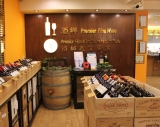| 酒評 |
The 2017 vintage for Sassicaia was described by winemaking consultant Graziana Grassini as 'contracted and difficult, but it evolved impressively well with great strides during the oak ageing'. The wine shows a great intensity and elegance on the super-restrained nose of bramble fruit, layered with cedar, kiwi peel and a touch of oak. Surprisingly velvety, silky tannins and brilliant acidity are supported by creamy mid-palate weight with an amazingly savoury finish of cedar and tobacco. By Decanter, Jun 2020.
Aromas of exotic spice, baked plum and French oak mingle with camphor and blue flower on the nose. This boasts extraordi-nary elegance and freshness despite the hot vin-tage, delivering flavors of juicy Marasca cherry, spiced blueberry, tobacco and licorice. Velvety, fine-grained tannins provide support while coffee and crushed mint linger on the finish. By Wine Enthusiast, Jun 2020.
The balance and beauty to this is impressive, offering sweet, ripe currants and flowers with some crushed-stone and dry-earth undertones. Full-bodied with soft, polished tannins and a long, creamy-textured finish. It’s polished, yet concentrated. Better after 2022, but already very seductive. By James Suckling, May 2020.
The 2017 Sassicaia is a fascinating wine that symbolizes a never-ending tug-of-war between vintner and vintage. The question is who comes out on top? In this case, my money is on the vintner. The 2017 vintage, characterized by scorching heat and drought across much of Italy, was not an easy one. However, vintners had ample time to prepare because those climatic challenges had already played out midway through the summer season. Vintners with experience such as that amassed at Tenuta San Guido (now on the eve of Sassicaia's 50th birthday celebration) knew exactly how to handle the tricky 2017 growing season. Fruit was harvested early to avoid any jammy sensations, and a strict selection process was employed in order to preserve the best clusters. This Sassicaia represents 83% Cabernet Sauvignon and 17% Cabernet Franc, with most of the fruit coming from the Tenuta's historic vineyards Castiglioncello, Quercione and Doccino. These plots are all located on the back hill of Bolgheri at slightly higher elevations where they enjoy cooler nighttime temperatures. Old vines also have a deeper root system that is key to braving dry and hot summers. You can absolutely taste those choices here thanks to the wine's aromatic profile that offers more variety-driven green highlights of wild berry, forest floor and bramble than I would have expected. By Wine Advocate, Jan 2020. |
















